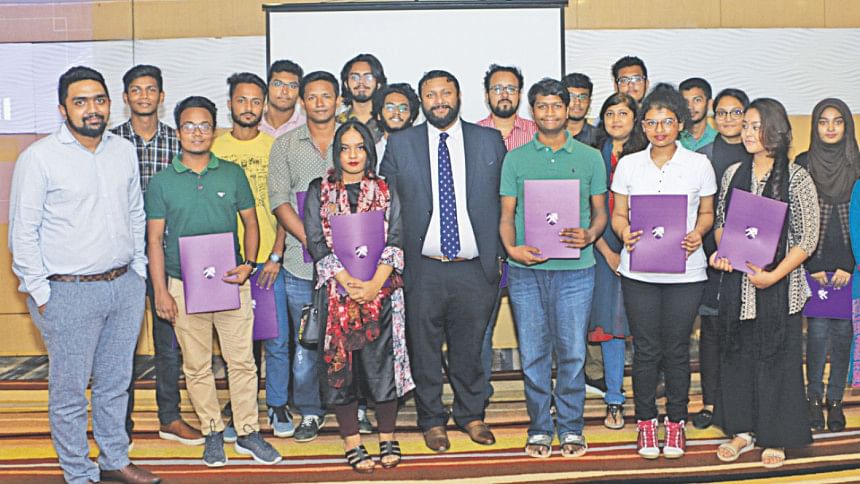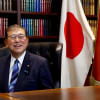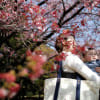Career and educational opportunities for Bangladeshis in the Land of the Rising Sun

Japan, the Land of the Rising Sun is not only a popular travel destination, it is increasingly becoming an educational hub for Bangladeshi students who want to pursue tertiary-level study abroad. This article delves into the lives, experiences, and successes of six Bangladeshi student alumni who completed undergraduate degrees at Ritsumeikan Asia Pacific University (APU) in Japan.
Imagine waking up at 7 AM on a crisp, spring morning in Beppu City (on the island of Kyushu). The sea awaits in front of your apartment, while jutting, rocky hills align the back. Soon you are waiting for the designated bus that will take you to a university on a hilltop, APU. Early morning classes that include learning Japanese language (which greatly increases your chances of attaining a good job in one of Japan's eminent companies), then going to your part-time job either at the university or nearby natural hot springs, is the order of the day for most international students such as, Jawad Mubashwir, Shihabun Sakib, Rubaiyat Islam,Tahmidur Islam, Rubaiyat Rafi and Muhammad Fatemee.
Jawad Mubashwir graduated in March 2017 from APU's College of International Management, majoring in Strategic Management and Organisation. He currently works as a business development executive for Marubishi, a Japanese food manufacturing/trading company. Around 400 Japanese and multinational companies visit APU annually to interview/recruit students in their 4th year. Jawad says that he applied for 8 jobs before this one and chose Marubishi because he wanted to start a Japan-Bangladesh bilateral business almost immediately, which his CEO recognised and eventually let him do. This was unlike other Japanese companies who said to him, 'We want you to come in with a blank head', meaning he would have to agree to be retrained according to company requirements, regardless of what he had learnt previously.
As for his decision to study at APU with an 80% scholarship and then later going on an exchange program to Stanford University in the US (funded by Japan Ministry of Education), Jawad believes he received a high return on his minimal investment by studying at APU (which has AACSB accreditation i.e., internationally recognised, specialised accreditation in accounting and business programs at tertiary level).
Shihabun Sakib is another APU alumni who graduated last year is working in a Japanese oil and gas company on overseas business development. Prior to graduation, Sakib applied to nine companies and received three job offers. He chose JAPEX because his undergraduate thesis was based on Finance and Energy, and thought this company would be a perfect match.
The first year of residency for international undergraduates must be spent at AP House, APU's on-campus dormitory. Sakib, like other student alumni, made life-long friendships there, with a diverse group of people. On his first day at APU, Sakib remembers the Residential Assistants (RAs) who help newcomers settle into university life. He was also the winner of the prestigious Ando Momofuku Award, awarded by Nissin Foods. For this, Sakib had to write ten essays about his life and experiences at APU. Sakib now feels that after his experience at APU and living in Japan, he does not think only about his own country but as a "global citizen". Thus, he changed from being an introvert to someone who became a leader in different activities like Bangladesh Week which showcases Bangladeshi culture at APU.
Lastly, Sakib says that, "if you want to challenge yourself and learn new things, APU is the best place". In light of employment, Japanese companies cannot fire employees on spot, on the rare occasions they do, the employer must pay high compensation. Therefore, there is lifetime job security in Japan. This fact has been backed up by all of the alumni mentioned.
A female member of the Bangladeshi alumni at APU, Rubaiyat Islam, is an Economics major who graduated earlier this year. She now works for Fujisoft Inc., a Japanese IT company, as a System Engineer for its Global Division. Rubaiyat is from Viqarunnisa Noon School & College who won a 100% scholarship to APU. She entered her current job because she has a dual interest in programming and economics and took courses accordingly at APU.
Rubaiyat says that the APU experience and living in Japan has transformed her into an independent, punctual, and less materialistic person. She says she really enjoyed outdoor sports as a student such as; long-distance cycling, camping, hiking on mountains, and taking part in Japanese festivals like the Summer, Pikachu, and Taketa Taketoro Chikuraku Light festivals.
Tahmidul Islam also received an 80% scholarship from APU and won numerous others. A student of Notre Dame College, Dhaka, Tahmid graduated from APU in 2016, majoring in Strategic Management and Organisation. However, he started working for one of Japan's leading Integrated Human Resources Service companies a year earlier and is now in a managerial position. Tahmid was an RA at AP House for 3 years, worked as a TA and taught English to schoolchildren. In his third year at APU, Tahmid organised the Business Case Competition on a national level which later became international. He says that even though he is an introvert, he is perfectly okay with this. Taking part in class discussions on different topics allowed him to think critically. APU taught him skills in leadership, communication, and adapting to different cultures.
Rubaiyat Rafi chose to work for an MNC, Daimler Trucks Asia as an HR Business Partner. This is the only multinational he applied to and gave a total of 6 interviews while job hunting. He has 6 months till graduation. Working in this company, Rafi says that he gets global exposure with a high salary. For six months Rafi went on an exchange program to Copenhagen Business School in Denmark and later became an advisor for exchange students.
Muhammad Fatemee is the current Chairman of APU Alumni Bangladesh Chapter. He graduated in 2013 in International Management and Marketing and is currently pursuing a PhD at University of Tokyo.
Similar to all cultures around the world, Japanese culture has its positive and negative aspects. For example, empathy is something that Japanese people follow in all spheres of their lives. Jawad says that "A Japanese person will put that extra effort to make someone else's experience better, even if they never meet that person again." Empathy, he believes, especially in business, is something needed in order to be successful. Sakib believes that the Japanese are "extremely precise," i.e., if one yen goes missing, they will spend the whole workday figuring out how that happened. Even if you make a mistake, they are extremely patient, Sakib mentions. Tokyo, where Tahmid now lives is very convenient and has an excellent train service. In addition, it is extremely clean, where the Japanese believe in Katasuke or leaving a place cleaner than you found it.
As far as negatives go, Jawad says, "As developed and mature as they are, Japanese are still very conservative, which is surprising," a view shared by the other alumni. Also, they are often indifferent to world events and there is a sense of mistrust of the West. Furthermore, Japanese people are very role-based, not only at work but also at home. In addition, Rubaiyat Islam and others feel that Japanese men can be very sexist. However, Rubaiyat says that they are not this way toward foreigners. If you can show you are qualified and capable at your job, women working in Japan should have no problems. Tahmid adds that, while the Japanese are extremely driven and ambitious, they can be stubborn. Fatemee says that the Japanese are not good at expressing their feelings which often creates confusion. Also, they think a lot before taking a decision and consult several people.
To sum up, all the student alumni (except Muhammad Fatemee) started their study abroad journeys through MACES, one of Bangladesh's leading education consulting firms established in 2007. It represents over 160 universities in the UK, USA, Canada, Japan, Malaysia, and Australia. In the words of Rouham Manzoor, Managing Partner, MACES is "the one stop for your foreign education ambitions" and, this is why over 3000 students consider it to be the best education consultancy in Bangladesh.
You can read the full version of this article on thedailystar.net/next-step.

 For all latest news, follow The Daily Star's Google News channel.
For all latest news, follow The Daily Star's Google News channel. 








Comments